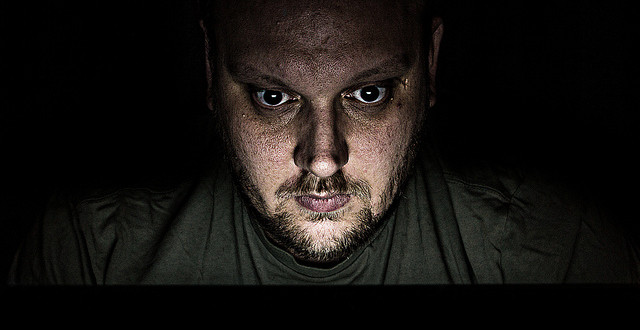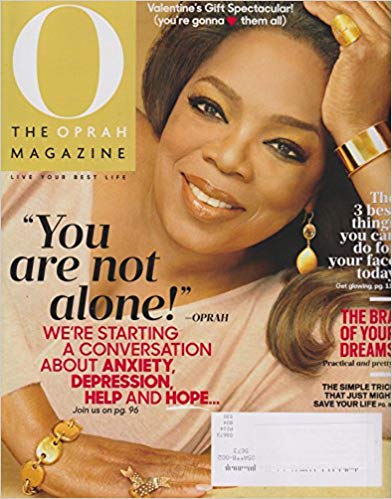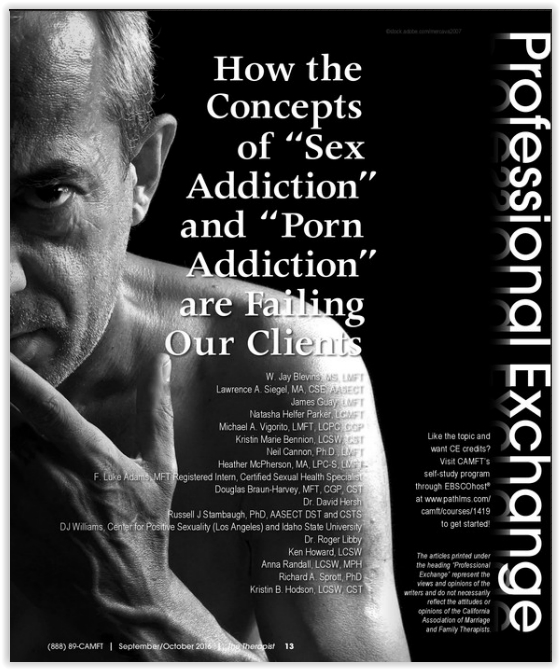Why We Need To Stop Talking About Porn And Sex Addiction
The terms sex addiction and porn addiction work great in titles. They are hot topics. People have such passionate views about them that they make great clickbait. These easily-recognized “enemies”, sex and porn, come pre-loaded with lots of shame and judgment. With those kinds of attributes, it is easy to start the “sex and porn are bad” bandwagon rolling. Tapping into the fear, shame and stigma around sex and porn allows the behavior to be framed as the reasons people, mostly men, are unable to have meaningful, connected relationships.
What it also does is allow us to ignore the real issue, which is the fact our society does a horrendous job teaching men about emotions and vulnerability. These are the foundations of emotionally intimate relationships, and they are not, pardon the pun, as sexy of a topic as sex or porn. Emotions and vulnerability do not have a clearly defined and associated target such as ending porn or stopping sex, which means educating men on vulnerability isn’t as easy a treatment to sell.
Making the focus on porn and sex instead of emotions has allowed many people to earn a great deal of money by leveraging the shame surrounding both sex and addiction. Selling vulnerability and connection isn’t nearly as easy. There have been some great articles recently about men who have set aside porn or changed their perspectives about sex and have found how powerful deeply connected, emotionally intimate relationships can be. Many of those men in the articles make the claim their problems stemmed from porn or sex addiction. They say these activities prevented them from having emotionally connected relationships. But they have it backwards.
These so-called addictions didn’t cause the problem. Porn and sex became the coping mechanisms and substitutes turned to because these men never learned to how to be vulnerable, how to handle their emotions or how to have truly connected relationships.
I refer to the heavy use of sex and porn as a so-called addiction because that’s what it is. People use the term addiction, but the reality is sex addiction and porn addiction are not actual, formal mental health diagnoses. In fact, they were intentionally not included in the latest version of the Diagnostic and Statistical Manual of Mental Disorders.
Omitted for a variety of reasons, including the fact no reliable research currently exists to support either of these habits as addictions, some of the most recent research indicates what happens when the brain is exposed to sex or porn is nothing we’d expect to see for an addiction.
It might seem like labeling a behavior an addiction doesn’t matter. We toss the term “addiction” around in everyday language all the time. But addiction is a very specific term. It has implications for both how we judge the person using and how we approach dealing with the issue.
Compulsions and addictions are identified and treated differently by the mental health community for a reason. Shifting the way we identify the issue shifts the focus from the actual issue. For example, we know that many people emotionally eat. When their emotions feel too big, or out of control, they eat to distract themselves and suppress those feelings. We don’t label that as food addiction. If we did, we would be focused on trying to eliminate food. Instead, we label it as emotional eating, which puts the focus on emotions. We don’t tell people to just stop eating. We help them learn the tools that change the nature of their relationship to food.
Real connection comes from vulnerability. It means dropping our defenses and letting others see our authentic selves. It means accepting all of the emotions, like fear and anxiety, so we can access love, joy and happiness. Unfortunately, vulnerability is seen as a weakness in our society, something that is not okay. Teaching men to connect also means teaching them it is okay to have emotions. There is nothing strong about shoving down or denying emotions, but it is so healthy to realize emotions are part of who we are. In addition to helping build our relationships, our emotions help us to make better, more informed decisions.
We need men to know it is not only okay to have emotions, but it is also okay for their partner to have emotions. A partner’s emotions are not attacks. It not necessary to avoid causing emotions in a partner. And it is definitely not anyone’s job to manage another person’s emotions.
All of these progressive initiatives go directly against what men are taught in our society. We tell them if you are vulnerable, you are weak. We tell them emotions should be denied, ignored and suppressed, except of course, for anger or happiness. If you can’t do that, you are weak. We tell them if they cause negative emotions in another person, they aren’t a nice person. We teach men everything that is the opposite of what creates healthy, connected relationships.
Without the right tools and understanding, many find other ways of coping since they do not have the level of connected relationships we all desire. In turn we act shocked and shame them. We refuse to acknowledge the real issue and turn to pick the easy targets of sex and porn. Shame is never the answer to creating meaningful change. It is time we stopped using the shame associated with sex, porn and addiction to pile more shame onto men who are ill-trained to accomplish what we want of them. Stopping use of the terms “sex addiction” and “porn addiction” is a good first step.
Let’s make the conversation about the real issue—how our society has failed men around the issues of emotions, vulnerability and intimacy. Let’s fight the hard battles and make meaningful changes that impact all facets of human interaction and connection.
–
If you are struggling with sex and porn use please watch The Power of Vulnerability and Listening to Shame by Brené Brown. Her TED Talks have helped other men to open up and accept themselves as the vulnerable, feeling and genuine beings they are. Wouldn’t it be fulfilling if you felt that way about yourself, too?
~~
Originally published at The Good Men Project.
Unedited Photo: Flickr/Dennis Skley












